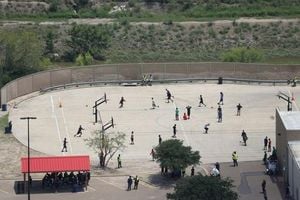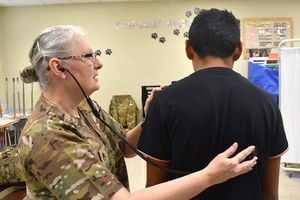On Tuesday, the Mexican government celebrated the official distribution of the first Pension Women’s Well-Being cards in Coatzacoalcos, marking a significant step toward improving social welfare for women in vulnerable situations. This program was announced by President Claudia Sheinbaum Pardo and is now coming to fruition.
During her visit to Coatzacoalcos, Juan Javier Gómez Cazarín, the Federal Delegate for Well-Being Programs in Veracruz, announced the successful handover of over 3,000 cards to women beneficiaries. This initial phase targets women aged 63 and 64, who will each receive bimonthly payments of 3,000 pesos directly, without intermediaries. The women who registered for this program in October will start receiving their cards by January, with November registrants being expected to pick theirs up by February.
"We come to reaffirm the commitments made by the President, so they can see she is a woman of her word and this transformation is increasingly solidified in the state of Veracruz. Today, we deliver over 3,000 Well-Being cards to women, fulfilling the promise made during her campaign," emphasized Gómez Cazarín.
This social initiative aims primarily to improve the quality of life for disadvantaged women, providing them with necessary financial support and access to basic services. “It’s assistance for those who need it before they receive their pensions. Once they reach 65, they will directly transition to the senior citizen pension. This support is for women who need help paying expenses, funding their children’s education, or keeping up with bills like electricity and water,” he noted.
Further enhancing local healthcare, Gómez Cazarín mentioned plans to train doctors and nurses from Coatzacoalcos and surrounding areas to implement the "Health, House by House" program, aimed at providing medical assistance to the elderly and disabled.
Continuing the commitment to social welfare, the Federal Government reiterated its efforts to combat school dropout rates through the Benito Juárez Scholarships. These economic aids support underprivileged students across all levels of education and are distributed via the Tarjeta del Bienestar. The delivery dates for the cards to new beneficiaries of the Benito Juárez Scholarship 2025 have been set for April 28 to May 2, 2025.
For families waiting on the financial support, the new program will increase the bimonthly payment to 1,900 pesos—a minimal increase of 60 pesos compared to last year’s amount. This adjustment has led to some dissatisfaction among beneficiaries, even though payments are guaranteed for all who register on time.
The Coordination of National Scholarships for Well-Being announced these details through their official X (formerly Twitter) account, confirming the importance of participating in mandatory informational assemblies held at the educational institutions from February 10 to 21, 2025, prior to the card distribution.
Students eligible for the Benito Juárez Scholarship must meet specific requirements, including registration at public educational institutions. The registration period for this scholarship runs from February 5 to 28, 2025, and applicants must submit the necessary documents, such as their birth certificate, CURP, and proof of school enrollment.
The Beca Rita Cetina is another new social program inaugurated under President Sheinbaum’s administration. Initially scheduled to start delivering cards on January 20, 2025, the date was recently pushed back to February 5 through March 28, 2025, for beneficiaries who registered in November and December 2024. This program aims to support more than 5.7 million students with bimonthly payments of 1,900 pesos.
Overall, these social welfare initiatives represent significant investments by the Mexican government aimed at eleviating the economic burdens faced by women and students, showcasing their commitment to social justice and accessibility to education.
The efforts to provide timely financial assistance through these new welfare programs highlight the government’s legislative focus on poverty alleviation and encouraging student retention. Beneficiaries are advised to stay proactive and informed about their respective programs to maximize the benefits available to them.



